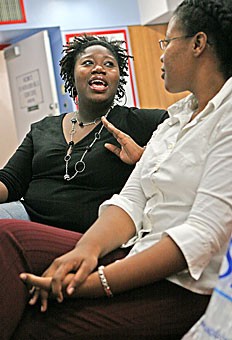Restoring student presence in the Dr. Martin Luther King Jr. Student Center was a topic of main concern at a town hall meeting last night.
Using the MLK center is a way of re-establishing the presence, power and purpose of the black student population at the UA, said Katherine Outlaw, moderator and coordinator of leadership.
“”Our power is our building,”” Outlaw said. “”We are not using that power.””
The center’s lost popularity can be attributed to the lack of integration between black and white students on campus, said Chinedu Nworu, an anatomy graduate student.
“”We should bring in others besides African-American people to the building,”” Nworu said. “”Our comfort zone is in one spot. Their comfort zone is everywhere, so for us to be comfortable with them, we need to bring them into our home.””
Ava M. Bivens, a political science junior, said integration will help eliminate the biases and stereotypes of black students.
“”If we integrate ourselves into other areas and say ‘I’m African-American, but that stereotype doesn’t apply to me,’ people will see that they have the same personalities and characteristics as we do,”” Bivens said.
Teresa Cheung, a journalism junior, said for students that are not black, the MLK Center can be intimidating.
“”I understand that it’s a public place,”” Cheung said. “”But when the majority of the people are a certain race that you’re not, it can be very uncomfortable.””
“”We are from a people who are less reserved,”” Bivens said. “”This is going to make the European-Americans uncomfortable.””
The MLK Center is an incredible source of power, but it is sometimes seen negatively, Outlaw said.
“”This is for black people,”” Outlaw said, “”but we don’t want to segregate ourselves.””
In hopes of bringing more people to the center, mailboxes will be installed for various clubs and organizations, Outlaw said.
Rob Woods, a political science senior, said that before bringing other people into the building, there has to be more integration among the black people themselves.
“”We need to focus on ourselves first, then look to integrate with others,”” Woods said. “”There are freshmen here on campus who don’t even know where the MLK Center is. We need to talk to these young black faces.””
“”Students actually fought for the building so they could have a voice here,”” Outlaw said. “”This used to be a fraternity house.””
There was a student demonstration outside the Administration building to fight for a center for blacks, Woods said.
As a result, the MLK Center was established and dedicated to be a resource for black students, Outlaw said.
“”There are people here at nights to help students with resumes and other things,”” Outlaw said. “”We have retreats for student clubs and organizations, and we’re open for everybody. If you want it, you can have it.””









